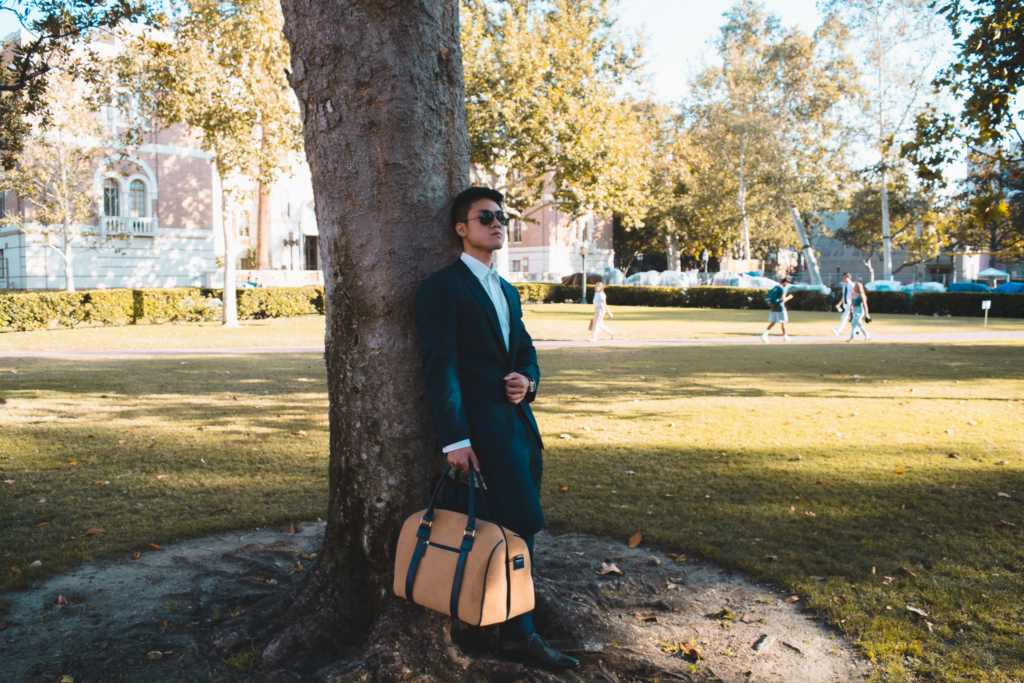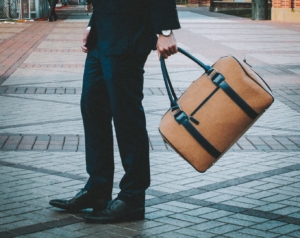
Mi Terro Global photo
A duffle suitcase. Made entirely out of cork and recycled ocean plastic.
For founders Robert Luo and Eesen Sivapalan, both former business students at University of Southern California’s Marshall School of Business, the bag is the product of Mi Terro, their green fashion brand company that focuses on eliminating waste and cleaning up the planet by creating premium fashion fabrics made from eco-friendly materials and environmental waste.
MY EARTH
The name, “Mi Terro” means “My Earth” in Portuguese.
“We chose Portuguese as the language of choice in honor of our first product, our duffle suitcase,” Sivapalan tells Poets&Quants for Undergrads. “As our duffle suitcase is primarily made from cork, and because cork is most abundant in Portugal, we wanted to use Portuguese as the language to name our company. We also want our customers to feel how we feel about our Earth. It is our home, so we should refer to it as such.”
Mi Terro first came into fruition when Luo attended a KPMG competition while at USC. It was at this competition that Luo learned about the benefits of Portuguese cork, a sustainable resource that’s taken from the bark of cork oaks. The entire process of Portuguese cork is sustainable.
“The trees aren’t cut down or damaged when the cork is harvested, and they can be harvested every nine years for the lifetime of the tree — roughly 270 years,” according to the Portugalist. “To cut down a cork tree you actually need a permit from the Portuguese Ministry of Agriculture, and it’ll illegal to cut a cork tree down without one.”
Luo has intrigued and was soon spending hours a day researching cork.
“After the competition, I spent five hours every day researching these materials,” Luo says. “After six months of research, experimentation, and traveling the globe to find manufacturers and suppliers, my team finally created the world’s first premium travel bag made from recycled ocean plastic and natural cork.”
ONE OF THE MOST POLLUTING INDUSTRIES IN THE WORLD
Fashion is one of the least sustainable industries in the world. From sourcing products to shipping to intricate supply chains and sometimes unethical labor, the process of making and selling clothes and other consumer product goods can be one of the harshest industries for our planet and its inhabitants.
According to Fast Company, the fashion industry generated 1.2 billion tons of greenhouse gases in 2015, more than all international flights and maritime shipping combined.
“We believe the future is about sustainability,” Luo says. “Fashion waste, plastic pollution, and deforestation are destroying our habitat. We must act now and act quickly.”
For Luo and Sivapalan, Mi Terro is their answer to addressing sustainability in the fashion industry.
“Our goal is to make green fashion affordable and to make Earth green again,” Luo says. “From creating the Forbes featured travel bag made from ocean plastics and natural cork to making a shirt from unwanted milk, we never stop discovering new ways to solve world problems through means of green fashion.”

Mi Terro Global photo
HOW IT ALL WORKS
To bring Mi Terro to life, Luo and his team met weekly to design the product.
“These were hand-drawn designs so that we could show the manufacturer how we wanted the final product to look like,” Sivapalan says.
Luo, who is originally from China, set out to make connections and find a suitable manufacturer that could bring their designs to life.
Mi Terro sources their cork material from Portugal and Spain and then ships the raw goods to their partnering manufacturer in China, where the final product is produced.
“It was a very time-intensive process,” Sivapalan explains. “We made lots of mistakes and we’ve learned a lot from them along the way so that the next products we release can be of even higher standards.”
Developing a suitable prototype with high-quality materials was one of the biggest challenges, Sivapalan says.
“There are other cork bags on the market, but the quality of the material is quite poor,” he says. “The cork material comes out looking very patchy. We approached over 10 manufacturers to eventually get the desired finished product.”
On top of actually producing the product, the Mi Terro team had to find ways to promote it to the general public.
“We only had one prototype and it is an expensive product, especially since we were working with a college student’s budget,” Sivapalan says. “So we were limited to local social media influencers, and influencers who wouldn’t charge much to pose with the product or promote the product. Thankfully, we’re in Los Angeles where there are a plethora of influencers and we were able to utilize the USC network to get access to plenty of people who were able to help us out.”
PEOPLE WANT CHANGE
The journey of bringing Mi Terro wasn’t easy, but one the team was able to bring their prototype to life, it met with widespread support.
The company was able to surpass its $10K Kickstarter funding goal in less than 15 days.
“We were ecstatic that so many people love our product,” Luo says. “It was an encouraging moment for us. At the same time, we knew that we have to go beyond people’s expectation and fulfill our promises. To us, this is just the beginning and we are ready to provide the best service and products possible.”
With their USC network, Luo and Sivapalan were able to access the Blackstone Launchpad, an entrepreneurship program that’s designed to support and mentor students, staff and alumni entrepreneurs in bringing their ideas to life.
Additionally, the team participated in startup venture competitions, such as USC’s New Venture Seed Competition, where students bring their startup ideas and compete for prize money.
“Through the New Venture Seed Competition, run by the Lloyd Greif Center for Entrepreneurial Studies, we had access to exclusive mentorship which helped us pivot and gave us much needed direction,” Sivapalan says.
Sivapalan says the amount of support his team received from the USC network was critical in helping Mi Terro become a reality.
“We’re lucky to have had phenomenal mentors — Professor Albert Napoli, Professor Elizabeth Amini, and James Bottom from USC’s Blackstone Launchpad,” Sivapalan says. “All of them were gracious enough to give us their time, support, and mentorship as we went from having an idea to a prototype to a successful Kickstarter, and to finally being finalists in the New Venture Seed Competition and Wrigley Competition.”
A GREENER TOMORROW
With the success of Mi Terro’s cork bag, Luo and Sivapalan have pushed to make even more sustainable products.
The company is currently launching its next two products, the Limitless Milk Shirt and Underwear.
“What’s special about these two products is that they’re primarily made from upcycled milk,” Sivapalan says. “According to a statistic from the Wall Street Journal, in 2016, American dairy farmers dumped about 43 million gallons of milk. There’s so much milk that just gets dumped away and we want to utilize the milk that gets unnecessarily thrown away.”
The Mi Terro products are the world’s first shirt and underwear made from upcycled milk.
“As long as we continue to stay focused on our mission, we know that more people will join us to live green and shop green,” Luo says. “We know the road is long, but we are ready to embark this journey.”











Questions about this article? Email us or leave a comment below.